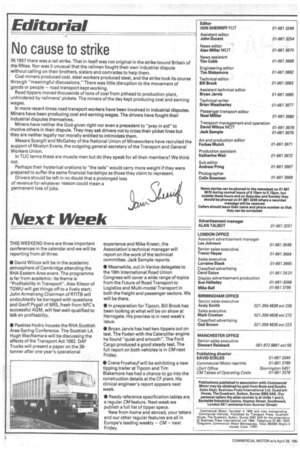No cause to strike
Page 4

If you've noticed an error in this article please click here to report it so we can fix it.
IN 1957 there was a rail strike. That in itself was not original in the strike-bound Britain of the fifties. Nor was it unusual that the railmen fought their own industrial dispute without calling on their brothers, sisters and comrades to help them, Coal miners produced coal, steel workers produced steel, and the strike took its course through "meaningful discussions." There was little disruption to the movement of goods or people — road transport kept working.
Road tippers moved thousands of tons of coal from pithead to production plant, unhindered by railmens' pickets. The miners of the day kept producing coal and earning wages.
In more recent times road transport workers have been involved in industrial disputes. Miners have been producing coal and earning wages. The drivers have fought their industrial disputes themselves.
Miners have neither the God-given right nor even a precedent to "pray in aid" to involve others in their dispute. They may ask drivers not to cross their picket lines but they are neither legally nor morally entitled to intimidate them.
Messrs Scargill and McGahey of the National Union of Mineworkers have recruited the support of Mostyn Evans, the outgoing general secretary of the Transport and General Workers Union.
In TUC terms these are muscle men but do they speak for all their members? We think not.
Perhaps their hysterical orations to "the lads" would carry more weight if they were prepared to suffer the same financial hardships as those they claim to represent. Drivers should be left in no doubt that a prolonged loss of revenue for whatever reason could mean a permanent loss of jobs.




































































































